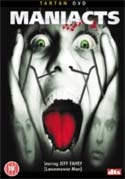
Joe (Jeff Fahey) is a psychopath with a mother-fixation. Living in a dingy hotel in the American mid-west, he is discovered harbouring the dead bodies of several prominent citizens alongside the remains of his mother. After being arrested he kills his lawyer, and is promptly placed in the 'Edgemore Clinic for the Criminally Insane'.
The patients of the clinic suffer the rule of the corrupt Matron Knull, as well as the weaselly Doctor Denton, who abuse and drug them at the slightest provocation. The inmates are forced to wear restraining devices around their ankles, preventing them from escaping by means of crippling electric shocks to the ankle.
Joe immediately makes a nuisance of himself. He lands himself in solitary confinement for nosing around and - more seriously - performs a mock-crucifixion that earns him electric shock therapy. It's Joe against the regime, then, and fellow murderer Beth soon takes a fancy to him.
Joe and Beth soon fall in love, and reveal to one another their major problems. Joseph recalls that his mother was seriously ill, and that she winded up dead after an administrative blunder which deprived her of the necessary medical treatment. Unable to cope without his mother, and seeking revenge, he vented his frustrations by killing those responsible.
Elizabeth's problems are also revealed to be Oedipal - she believes that she was abandoned by Queen Elizabeth as a child, and desperately wants to be reunited with 'her' lost mother. Her instability is a result of her lack of a mother.
Matron Knull decides that she's had enough of Joseph, and sends one of the guards to execute him. Joseph is saved, however, by the friendly caretaker Mason, who gives him his security pass to escape undetected. Joe breaks free, but regrets having to leave Beth.
Knull suspects Beth's complicity with Joe's escape. Her intuition proves to be misplaced but she tortures Beth anyway - with a high pressure hosepipe.
Joe finds great difficulty adapting to life outside, and he promptly breaks back into the clinic. After rescuing Beth they massacre the corrupt prison officials, and take to life on the run. They soon meet friendly farmer Boley, who allows them to stay with him provided they earn their keep by working the farm. After adapting to normal life, it is only a matter of time before they become discoveredů
As stated above, this is an emphatically Oedipal film. He root of Beth's and Joe's problems are entirely due to a maternal absence, and they consequently cannot cope without the stability of a mother. The film, fittingly, is filled with maternal figures - some good, some bad. Matron Knull is the typical 'bad mother'. 'Matron' is a variation of 'mother'. Knull rules the roost, but she abuses those whom she should be helping. Conversely, Beth can be seen as a substitute 'good' mother. She helps Joe to come to terms with the murders he committed, justifying his acts by reminding him that his victims deserved to die. In response he tells her: "How about I don't do anything unless you say so first", after cradling his head on her chest. The film is fittingly dedicated to Joe Spinnell, the outstanding character actor who appeared in 'Maniac', 'Sorcerer' and 'Cruising', who himself suffered a great deal of torment following the death of his own mother in the 1980s.
Depicting an Oedipal killer is nothing new, especially in a rural massacre film. In pictures such as Jeff Gillen and Alan Ormsby's excellent 'Deranged' (1974), the killer's obsession with his dead mother has devastating consequences: after Ezra murders and strings up a young woman he shatteringly comes to terms with the extent of his illness, by breaking down in a fit of misery.
'Maniacts' differs from this trend; it has a far more progressive attitude to madness. Joe, as with Oedipal sons in psychological thrillers, is virginal. After escaping he loses his cherry with Beth. Unlike Norman Bates and Ezra Cobb, however, Joe is able to overcome his sexual inadequacy. After escaping from the clinic, the two killers form a self-sufficient lifestyle and cope with their illnesses together, for a while, at least. The film advocates alternative methods of illness recovery, away from the stifling system that tries to curb individualism by keeping patients semi-conscious with drugs.
Part of the film's attitude, however, is misguided. From the start Joe's apparent mental illness is evoked as a positive source of creativity. Following his mock crucifixion, Beth tells him that he's "an artist". During the Edgemore sequences Joe is constantly framed alone, with smaller groups of mental patients watching him as if he's something special: he's presented as an iconic figure. Unfortunately, viewers may find themselves disagreeing with Beth and the patients: Joe's childish actions befit a joker rather than an artist, and he does nothing to merit special treatment and near deification.
Presented in the 1.33:1 full screen ratio, the film is given a crisp transfer that captures skin tones accurately and deals well with colour separations. Early scenes in the Edgemore Clinic have a harsh, overexposed look, but this is a creative choice by the director instead of a shortcoming regarding the transfer. It is uncertain whether the film was shot in widescreen or the fullscreen format. Compositions look fine, however, as the image does not appear cropped at the edges and gives the characters plenty of breathing space.
There are three choices in the sound department: Dolby Stereo, Dolby 5.1 and DTS Digital Surround Sound.
Aside from the original trailer and a Tartan trailer reel, this is a barebones release by Tartan, perhaps fitting given the mediocre main feature.
Review by Matthew Sanderson
| Released by Tartan |
| Region All PAL |
| Rated 18 |
| Extras : Trailer, Tartan Trailer Reel |